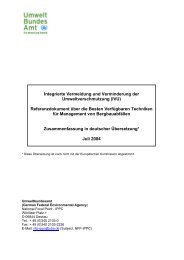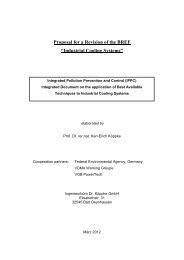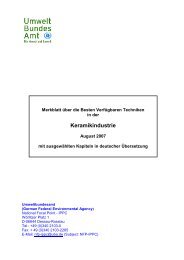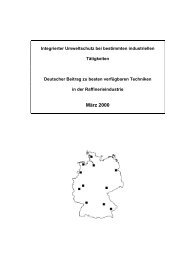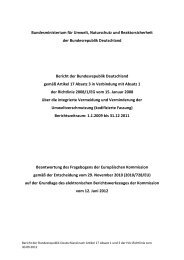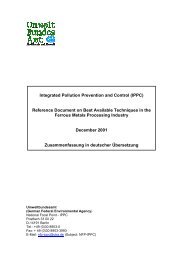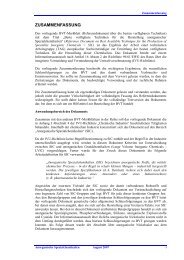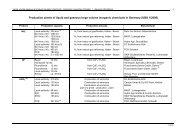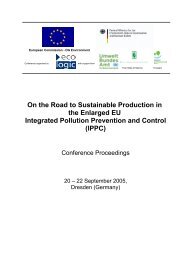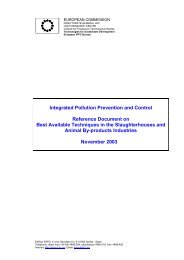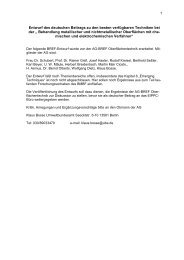- Seite 1 und 2:
INSTITUT FÜR SIEDLUNGSWASSERWIRTSC
- Seite 3 und 4:
Bezeichnungen und Abkürzungen ATV:
- Seite 5 und 6:
Einleitung Seite 1-2 KAPITEL 1 DEUT
- Seite 7 und 8:
Einleitung Seite 1-4 1.2.1 BREF 25:
- Seite 9 und 10:
Einleitung Seite 1-6 1.2.2 BREF 26:
- Seite 11 und 12:
• Bewertung der Notwendigkeit der
- Seite 13 und 14:
Teil 1: Erstellung von BVT-Merkblä
- Seite 15 und 16:
Abbildungsverzeichnis Teil 1 Seite
- Seite 17 und 18:
2 Die Richtlinie 96/61/EG - IVU-Ric
- Seite 19 und 20:
Teil 1 Seite 2-4 gen wird eine Übe
- Seite 21 und 22:
Teil 1 Seite 2-6 Abbildung 2-1: Dar
- Seite 23 und 24:
Teil 1 Seite 2-8 der IVU-Richtlinie
- Seite 25 und 26:
Teil 1 Seite 2-10 Abbildung 2-3: De
- Seite 27 und 28:
Teil 1 Seite 2-12 bezeichnet; von d
- Seite 29 und 30:
Teil 1 Seite 2-14 len diese inhaltl
- Seite 31 und 32:
3.3 Erarbeitungsprozess der BVT-Mer
- Seite 33 und 34:
Teil 1 Seite 3-18 Merkblattes bei w
- Seite 35 und 36:
Teil 1 Seite 3-20 Ursprünglich war
- Seite 37 und 38:
Teil 1 Seite 3-22 Kapitel 1: Allgem
- Seite 39 und 40:
Teil 1 Seite 3-24 Einsatz; hierzu g
- Seite 41 und 42:
Teil 1 Seite 3-26 Merkblatt hingewi
- Seite 43 und 44:
4 Literaturverzeichnis Teil 1 Seite
- Seite 45 und 46:
Teil 1 Seite 4-30 ENGELHARDT, H.: B
- Seite 47 und 48:
Teil 1 Seite 4-32 UMWELTBUNDESAMT (
- Seite 49 und 50:
6 Anhang: RICHTLINIE 96/61/EG DES R
- Seite 51 und 52:
Teil 1 Seite 6-36 Verminderung der
- Seite 53 und 54:
Anlage übertragen worden ist. Arti
- Seite 55 und 56:
Teil 1 Seite 6-40 Mitgliedstaaten b
- Seite 57 und 58:
Teil 1 Seite 6-42 stimmung im Aussc
- Seite 59 und 60:
Teil 1 Seite 6-44 d) von Salzen wie
- Seite 61 und 62:
ANHANG IV Teil 1 Seite 6-46 Bei der
- Seite 63 und 64:
Inhaltsverzeichnis ===============
- Seite 65 und 66:
Teil 2 Seite III 3.1.4 Schlachtbetr
- Seite 67 und 68:
Teil 2 Seite V 6.1.2 Fischmehl- und
- Seite 69 und 70:
Tabellenverzeichnis Teil 2 Seite VI
- Seite 71 und 72:
Teil 2 Seite IX Beste Verfügbare T
- Seite 73 und 74:
Teil 2 Seite 1-2 Animal Food Slaugh
- Seite 75 und 76:
shanks 6% head 4% abdominal fat 1%
- Seite 77 und 78:
Teil 2 Seite 1-6 kann jedoch für d
- Seite 79 und 80:
Schleswig-Holstein Niedersachsen No
- Seite 81 und 82:
Teil 2 Seite 1-10 In der folgenden
- Seite 83 und 84:
Teil 2 Seite 1-12 1.3 Wirtschaftlic
- Seite 85 und 86:
1.3.3 Verbrauchs- und Emissionskost
- Seite 87 und 88:
Teil 2 Seite 1-16 Zusammen verstär
- Seite 89 und 90:
Teil 2 Seite 2-18 Detergent foam Co
- Seite 91 und 92:
Teil 2 Seite 2-20 Enthäutemessern
- Seite 93 und 94:
Teil 2 Seite 2-22 INPUTS Detergent
- Seite 95 und 96:
Teil 2 Seite 2-24 Tabelle 2-1: Übe
- Seite 97 und 98:
Teil 2 Seite 3-26 3 Stromverbrauch
- Seite 99 und 100:
Teil 2 Seite 3-28 Tabelle 3-2: Meng
- Seite 101 und 102:
Personalhygiene 6% Kuttelei 13% Per
- Seite 103 und 104:
Zerlegung 2% Schlachtung 30% Schlac
- Seite 105 und 106:
3.1.3.4 Entfederung 3.1.3.5 Kuttele
- Seite 107 und 108:
Flüssigphase aus der Entwässerung
- Seite 109 und 110:
Teil 2 Seite 3-38 Nebenprodukte der
- Seite 111 und 112:
Teil 2 Seite 3-40 Tabelle 3-7: Besc
- Seite 113 und 114:
Teil 2 Seite 3-42 Gesamtbetriebsabw
- Seite 115 und 116:
Teil 2 Seite 3-44 Die folgende Graf
- Seite 117 und 118:
3.2.8 Verbrennung von Talg Teil 2 S
- Seite 119 und 120:
4.2.1.6.1 Kondensationsbrühtunnel
- Seite 121 und 122:
Wasserverbrauch Medienübergreifend
- Seite 123 und 124:
Hauptsächlich erreichte verbessert
- Seite 125 und 126:
Teil 2 Seite 4-54 4.2.4 Speicherung
- Seite 127 und 128:
Teil 2 Seite 4-56 4.2.4.6 Schlachta
- Seite 129 und 130:
Teil 2 Seite 4-58 Tabelle 4-3: Rein
- Seite 131 und 132:
- Biofilter - Biowäscher 4.3 Tiern
- Seite 133 und 134:
Teil 2 Seite 4-62 das Material ist.
- Seite 135 und 136:
Teil 2 Seite 4-64 u. U. eine Neutra
- Seite 137 und 138:
BK Alkalisierung sonst. Abw. Ammoni
- Seite 139 und 140:
Teil 2 Seite 4-68 Tabelle 4-7: Zu-
- Seite 141 und 142:
Teil 2 Seite 4-70 Des weiteren müs
- Seite 143 und 144:
• Der Bluttank ist regelmäßig z
- Seite 145 und 146:
Teil 2 Seite 6-74 6 Entstehende Tec
- Seite 147 und 148:
6.1.2 Fischmehl- und Fischölherste
- Seite 149 und 150:
6.1.4 Blutverarbeitung Teil 2 Seite
- Seite 151 und 152:
6.1.5 Federn Teil 2 Seite 6-80 Die
- Seite 153 und 154:
6.1.6 Fettschmelzung Teil 2 Seite 6
- Seite 155 und 156:
Teil 2 Seite 7-84 Bei großen Tiere
- Seite 157 und 158:
Teil 2 Seite 7-86 Element dar. Die
- Seite 159 und 160:
Teil 2 Seite 7-88 7.5 Beziehungen z
- Seite 161 und 162:
Teil 2 Seite 7-90 BVT-Werte auf Gru
- Seite 163 und 164:
Teil 2 Seite 7-92 werden, werden di
- Seite 165 und 166:
Teil 2 Seite 7-94 Stufe 1 5.1 BVT f
- Seite 167 und 168:
Teil 2 Seite 7-96 Für die wesentli
- Seite 169 und 170:
Teil 2 Seite 7-98 schrubber zu verw
- Seite 171 und 172:
Teil 2 Seite 7-100 niedrige wie ang
- Seite 173 und 174:
Teil 2 Seite 7-102 Die TAG legte al
- Seite 175 und 176:
Teil 2 Seite 7-104 der energetische
- Seite 177 und 178:
Teil 2 Seite 8-106 1 Die Minimierun
- Seite 179 und 180:
VDI Richtl. 2596 Emissionsminderung
- Seite 181 und 182:
Teil 3: Zusammenstellung der durch
- Seite 183 und 184:
Teil 3 Seite II List of Contents ==
- Seite 185 und 186:
Teil 3 Seite IV 4.1.2 Slaughter ...
- Seite 187 und 188:
Teil 3 Seite VI 7.1.1 Rendering ...
- Seite 189 und 190:
Teil 3 Seite VIII 8.2.3.3 Separate
- Seite 191 und 192:
Index of Tables Teil 3 Seite X Tabl
- Seite 193 und 194:
Teil 3 Seite XII Best Available Tec
- Seite 195 und 196:
Teil 3 Seite 1-2 Animal Food Slaugh
- Seite 197 und 198:
Teil 3 Seite 1-4 The following diag
- Seite 199 und 200:
Teil 3 Seite 1-6 Table 1-2: Geograp
- Seite 201 und 202:
Schleswig-Holstein Niedersachsen No
- Seite 203 und 204:
Teil 3 Seite 1-10 ceutical or techn
- Seite 205 und 206:
Teil 3 Seite 1-12 Table 1-8: Compan
- Seite 207 und 208:
Teil 3 Seite 1-14 The amount of ste
- Seite 209 und 210:
Teil 3 Seite 2-1 2 PROCESSES AND TE
- Seite 211 und 212:
2.1.1.1 Lairage Teil 3 Seite 2-3 As
- Seite 213 und 214:
Teil 3 Seite 2-5 the rumen is spin-
- Seite 215 und 216:
2.1.2.1 Delivery of birds 2.1.2.2 S
- Seite 217 und 218:
Teil 3 Seite 2-9 Figure 2-3: Presen
- Seite 219 und 220:
- Rinsing of the carcasses and carc
- Seite 221 und 222:
Teil 3 Seite 3-4 the currently usua
- Seite 223 und 224:
Zerlegung 2% Schlachtung 30% Schlac
- Seite 225 und 226:
3.1.3.4 Plucking 3.1.3.5 Eviscerati
- Seite 227 und 228:
Liquid phase from the dewatering (y
- Seite 229 und 230:
Teil 3 Seite 4-2 - Re- use of salt
- Seite 231 und 232:
[to be completed] Main achieved env
- Seite 233 und 234:
Teil 3 Seite 4-6 - Efficient use an
- Seite 235 und 236:
Teil 3 Seite 4-8 heat exchangers, p
- Seite 237 und 238:
Teil 3 Seite 4-10 The situation wit
- Seite 239 und 240:
Teil 3 Seite 4-12 rect evaporation
- Seite 241 und 242:
Teil 3 Seite 4-14 Additional heat e
- Seite 243 und 244:
Weight loss after 24 hours Temperat
- Seite 245 und 246:
4.2.5 Evisceration Reference to act
- Seite 247 und 248:
Achieved environmental benefits Cro
- Seite 249 und 250:
4.5.1 Mechanical treatment 4.5.1.1
- Seite 251 und 252:
Teil 3 Seite 4-24 Both in terms of
- Seite 253 und 254:
Teil 3 Seite 4-26 4.5.2.1 Ammoniaca
- Seite 255 und 256:
Teil 3 Seite 4-28 Brögbern animal
- Seite 257 und 258:
Teil 3 Seite 4-30 The decision depe
- Seite 259 und 260:
Teil 3 Seite 4-32 closed area can b
- Seite 261 und 262:
Teil 3 Seite 4-34 coincides with th
- Seite 263 und 264:
Teil 3 Seite 4-36 At a slaughterhou
- Seite 265 und 266:
Age of sludge (tTS) Is this of spec
- Seite 267 und 268:
Example plants Teil 3 Seite 4-40 Co
- Seite 269 und 270:
BSB5 - load Bd (BSB ) NH4 -N - load
- Seite 271 und 272:
Fe Fl Fe Fl P D MB Teil 3 Seite 4-4
- Seite 273 und 274:
Teil 3 Seite 4-46 Parameters Unit M
- Seite 275 und 276:
Teil 3 Seite 4-48 To optimise the m
- Seite 277 und 278:
Driving force for implementation Ex
- Seite 279 und 280:
Teil 3 Seite 4-52 Table 4-15 Dimens
- Seite 281 und 282:
Teil 3 Seite 4-54 liquid fertiliser
- Seite 283 und 284:
- No cross media effects Teil 3 Sei
- Seite 285 und 286:
Teil 3 Seite 4-58 3. Filtermaterial
- Seite 287 und 288:
Decomposition level Measure- Teil 3
- Seite 289 und 290:
Teil 3 Seite 6-2 FAT/ HEAT TRANSFER
- Seite 291 und 292:
Teil 3 Seite 6-4 Clarification plan
- Seite 293 und 294:
Teil 3 Seite 6-6 ENERGY FAT/ HEAT C
- Seite 295 und 296:
Teil 3 Seite 6-8 ENERGY/ STEAM INPU
- Seite 297 und 298:
Teil 3 Seite 6-10 water if necessar
- Seite 299 und 300:
Teil 3 Seite 6-12 - In- vessel comp
- Seite 301 und 302:
Teil 3 Seite 6-14 For 1000 kg of de
- Seite 303 und 304:
Teil 3 Seite 6-16 Liming is usually
- Seite 305 und 306:
Teil 3 Seite 6-18 ceous earth filte
- Seite 307 und 308:
See description under 1 Limed bone
- Seite 309 und 310:
H Concentration See description und
- Seite 311 und 312:
Teil 3 Seite 6-24 The excess acid i
- Seite 313 und 314: Teil 3 Seite 7-1 7 CURRENT CONSUMPT
- Seite 315 und 316: 7.1.1 Rendering 7.1.1.1 Water Teil
- Seite 317 und 318: Teil 3 Seite 7-5 - Cleaning wastewa
- Seite 319 und 320: Teil 3 Seite 7-7 Table 7-5 shows th
- Seite 321 und 322: 7.1.2 Fat melting 7.1.3 Fish meal a
- Seite 323 und 324: Teil 3 Seite 8-1 8 TECHNIQUES TO CO
- Seite 325 und 326: Reference literature Teil 3 Seite 8
- Seite 327 und 328: Teil 3 Seite 8-5 Corporate clarific
- Seite 329 und 330: Economics Driving force for impleme
- Seite 331 und 332: 8.1.9 Rubishes Teil 3 Seite 8-9 8.1
- Seite 333 und 334: Oberding animal carcass disposal pl
- Seite 335 und 336: Operational data Applicability Econ
- Seite 337 und 338: Teil 3 Seite 8-15 Corporate clarifi
- Seite 339 und 340: Driving force for implementation Ex
- Seite 341 und 342: Continuous sterilisation Teil 3 Sei
- Seite 343 und 344: Teil 3 Seite 8-21 through a system
- Seite 345 und 346: Cross media effects Operational dat
- Seite 347 und 348: Teil 3 Seite 8-25 The energy requir
- Seite 349 und 350: Teil 3 Seite 8-27 For the wastewate
- Seite 351 und 352: Teil 3 Seite 8-29 Corporate clarifi
- Seite 353 und 354: Driving force for implementation Ex
- Seite 355 und 356: Teil 3 Seite 8-33 Table 8-3: Perfor
- Seite 357 und 358: Teil 3 Seite 8-35 one often tries t
- Seite 359 und 360: Teil 3 Seite 8-37 storage rooms and
- Seite 361 und 362: Teil 3 Seite 8-39 Rethmann TBA Gent
- Seite 363: Teil 3 Seite 9-1 9 BEST AVAILABLE T
- Seite 367 und 368: Investition Re-Invest © 150 TDM 50
- Seite 369 und 370: Teil 3 Seite 10-6 combustion chambe
- Seite 371 und 372: Teil 3 Seite 10-8 Table 10-1: Exhau
- Seite 373 und 374: Teil 3 Seite 10-10 largely converte
- Seite 375 und 376: 10.2 Addition THH_HPTH Teil 3 Seite
- Seite 377 und 378: Teil 4: Zusammenstellung der durch



